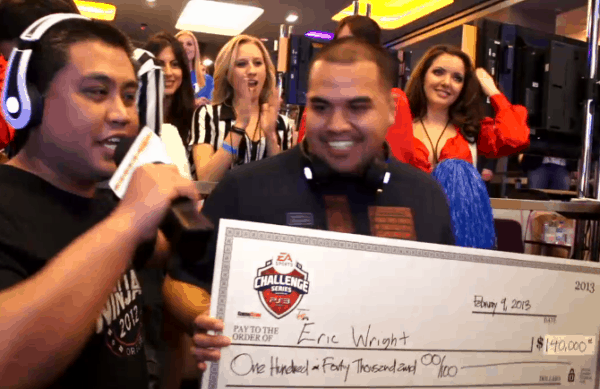Why Virgin Gaming is Player One in Cash-Competitive Online Gaming

In February, Eric Wright, who is better known to many as “melborp22” on the Virgin Gaming platform, won the 2013 Madden EA Sports Challenge in Las Vegas. In February, Eric Wright, who is better known to many as “melborp22” on the Virgin Gaming platform, won the 2013 Madden EA Sports Challenge in Las Vegas and walked away with a novelty-sized cheque for $140,000, part of a total of $1 million in prizes that was shared among the video game tournament’s winners.
In a post-victory interview Wright was asked, “What’s it like playing in a competitive sports arena like this one?” as though he had just stepped off the field after a victory dance in the end zone. The actual moment of his victory looked more like a couple guys rising from a couch in a tricked out rec room, surrounded by onlookers and a couple of girls dressed in red and white Virgin Media cheerleader costumes.
“It’s amazing,” said Wright. “It’s one of the best venues I’ve ever been to, as far as Madden tournaments I’ve been at. I’ve been to a lot of tournaments, Madden ’05 all the way up until now, and I would say it’s probably, you know, up there. Probably the best.” Prizes were also awarded for FIFA and NHL gamers, but with Madden NFL being America’s most popular sports videogame, Wright was getting most of the attention.
Asked for advice to other players who want to reach his skill level, Wright offered, “Practice a lot. Play on Virgin Gaming. Play people that are putting up money. Don’t play for free all the time. When you put up money, and money’s on the line, you get to see a lot better competition, and Virgin Gaming offers that.”
While smaller than its leviathan competitors in the multi-billion dollar gaming space, Virgin Gaming’s business plan has been defined by artful maneuvering and the tactical employ of partners -traits not unfamiliar to those who play games such as Battlefield 3 or Assassin’s Creed.
Founded in 2006 in Toronto as World Gaming, Virgin Gaming settled on its current name after becoming a subsidiary of Richard Branson’s Virgin Media in 2010. Today, the company’s proprietary platform connects to live game data and allows console gamers to compete directly in real time for cash and prizes, whether sitting at home or in a tournament environment.
While smaller than its leviathan competitors in the multi-billion dollar gaming space, Virgin Gaming’s business plan has been defined by artful maneuvering and the tactical employ of partners -traits not unfamiliar to those who play games such as Battlefield 3 or Assassin’s Creed. Using stealth instead of size, Virgin now stands as the odds-on–favourite to cash in on the lucrative cash-wager competitive online video game tournaments space.
CEO Rob Segal says the company’s measured approach to the space is the reason it has gained an advantage.
“We have official partnerships with leading publishers that grant us the ability to report in real time, along with an exclusive platform deal with Xbox,” he says. “This process has evolved over the last three years which means three years of development work in conjunction with the publishers. This experience and knowledge has come from lots of hard work and sleepless nights but ultimately erects major barriers in the face of potential competitors.”
Virgin Gaming may also be benefiting from something that is much harder to control: timing. The way people interact with money online is undergoing a sea change.
Virgin’s scale means the online experience for competition is seamless. The firm now boasts more than 2.7 million gamers, which Segal says translates into great player liquidity, meaning there is always an opponent to play at any given time of day.
Virgin Gaming may also be benefiting from something that is much harder to control: timing. The way people interact with money online is undergoing a sea change.
Andreessen Horowitz investor Chris Dixon says gaming is a perfect example of a new segment of the online economy he calls “snacks”. “These are simple, focused products that capture an atomic behavior,” he explains. This, he says, is “quickly becoming the dominant business model for games, replacing up-front payments and banner ads”. Dixon notes that there are now individual games that generate a billion dollars per year from in-app payments.
PS3 or Xbox users may have had their first experience “snacking”on the purchase of a game on one of those consoles in 2007 or 2008, and now regard this as innate behaviour. The colorful diversion that is “Candy Crush” now generates a gaudy $850,000 every day. For Virgin, this means any worries that paying for virtual goods online is a thing of the past. The pace of this development obscures the fact that getting people to fork over their credit card number to gamble in a virtual world would have been considered a serious impediment to Virgin Gaming’s business model just a few years ago.
Segal adds that not only has the transaction become safe, the authority the company has worked to provide is robust, meaning players can trust that they aren’t being gamed while gaming for cash.
“There are other companies who have tried to operate in this space but they were doing so without official partnerships with the publishers or the tech platform to make the experience safe, secure and fully automated,” he says. “This meant they were putting the onus on the actual gamers to self-report the results of their game”.
As a result, tournaments in the past devolved into minor hackathons, driving away a large swath of potential customers.
“There was nothing to stop one competitor from either not showing up to their match or calling in incorrect match scores which ultimately led to a terrible user experience for everyone,” explains Segal.
In addition to adding FIFA and NBA games to its roster last month, Virgin Gaming has just launched its Premium subscription service, which hopes to tap into the community-based aspects of league creation and real time online competition. The expansion of tournaments and avenues for serious gamers to earn an income from gaming will be essential to staking out a victory in a huge market that’s ready to get even larger. Segal’s own stats paint the demographic for competitive gaming as “99% male, 18-34, sweet spot approx 24-26. Average customer currently plays 16 hours a month on the site with $100 in average play.”
Virgin Gaming’s innovation has been to bring the world of competitive tournament-style gaming into people’s living rooms by setting up a space where users can create profiles and interact and compete with each other, posting up their scores on leader boards and exchanging stats, all within the confines of a Virgin ecosystem. With over 1.5 million users in 138 countries, players compete against each other for real cash playing games such as Halo 4, FIFA 13, Madden 13, NBA 2K13 and NHL 13.
It may come as a shock to Eric Wright’s parents’ generation, who might have grown up watching 8-bit Super Mario run up a few crude steel girders in a game that could be mastered in approximately an hour, that there’s money to be made playing on-line videogames, not only in the form of tournament winnings, but also just in the course of everyday game play. But that is where we are now.
In August, more than a million people in forty countries watched a livestream of the competition for DOTA 2’s The International, which handed out $2.8-million in prizes.
The South Korean StarCraft gaming phenomenon, which emerged in the late 1990s after South Korea’s government decided to make ubiquitous broadband internet a priority, attracts huge audiences, who gather in nightclubs to watch the best players, who are treated as rock stars or minor royalty. Four million South Koreans, out of a total population of 50-million, are playing online videogames at any given time.
Rather than a sly marketing pitch, competitive multi-player gaming for cash stakes is a clearly a grassroots cultural phenomenon. There is still a lot left to be decided before the money in tournaments here matches the frenzy that has emerged in Asia. But in North America, at least, Virgin Gaming has clearly emerged as Player One.
_____________

Terry Dawes
Writer

